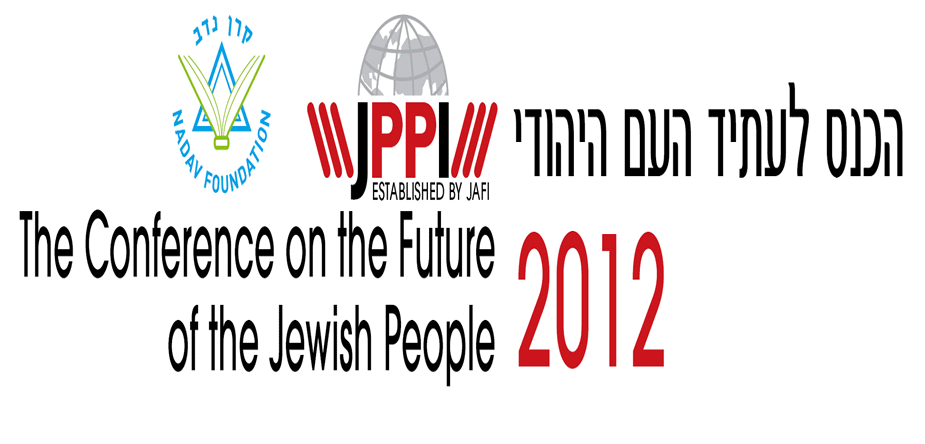 In light of the ongoing global economic crisis and the changing trends in Jewish philanthropy:
In light of the ongoing global economic crisis and the changing trends in Jewish philanthropy:
World Jewish leaders to gather in Jerusalem and for the first time examine whether the Jewish world allocates its budget efficiently
Israeli President, Prime Minister among the participants at the Conference
organized by the Jewish People Policy Institute (JPPI)
October 30-31, 2012 Mount Zion Hotel, Jerusalem
More than 120 major Jewish leaders, decision makers and prominent academics from around the Jewish world, will attend “The Conference on the Future of the Jewish People”, taking place next week, October 30-31, at the Mount Zion Hotel in Jerusalem. The goal of the conference, in which both President Shimon Peres and Prime Minister Benjamin Netanyahu will participate, is to hold in-depth discussions on the strategic issues affecting the future of the Jewish People and the State of Israel.
The conference is organized by the Jewish People Policy Institute (established by the Jewish Agency for Israel), in partnership with the NADAV Foundation.
The main topics to be discussed at the Conference are:
1. Uncertain Realities: The Geopolitical Landscape
2. Agreeing to Disagree: Jewish Peoplehood – Between Attachment and Criticism
3. Promoting New Young Jewish Leadership
4. Jewish Identity and Identification
5. Building a Jewish People Perspective on Ways and Means
JPPI President Avinoam Bar-Yosef, stressed that the conference will, for the first time, raise the issue of managing the budgets and resources within the Jewish world in light of the ongoing global economic crisis and the changing trends in Jewish philanthropy.
“For the first time, we can see that the Israeli government is taking Diaspora Jewry seriously, viewing it as a strategic asset to Israel, and that it is willing to invest in its future to maintain its power and influence,” explained Bar-Yosef. “We will hold a special session at the conference with senior government officials and leaders of Jewish organizations to identify joint projects that can strengthen future generations. Separately, conference participants will look at the entirety of the resources available within the Jewish world and will consider more efficient ways to utilize them to meet future strategic needs of the Jewish people.”
The Conference, with participants drawn from among the Jewish world’s top leadership, will also address the challenge of leadership changes within Jewish organizations and communities and of advancing new, young leadership. The plenaries will include a conversation with President Peres hosted by Ambassador Dennis Ross, a lecture by Jewish-French philosopher Bernard-Henri Lévy, and encounters with leaders of Israeli political parties and prominent young politicians, as well as with the US Ambassador to Israel Dan Shapiro and Chairman of the Jewish Agency Natan Sharansky.
In-depth discussions will be held in focused working groups and will be based on background papers that deal, among other issues, with the Iranian threat and with the challenges arising from the changes in the Middle East; developing a more efficient approach to budgeting and prioritization; Jewish identity and identification – new patterns, meanings and networks; and Jewish peoplehood – between attachment and criticism. Policy recommendations arising from the conference will be presented by JPPI to decision makers in Israel and the Diaspora.
The Jerusalem-based JPPI was established as an independent think-tank that aims to help ensure a thriving future for the Jewish people by providing analytical and strategic planning tools on issues of paramount importance to the Jewish world. Since its establishment, the Institute has succeeded in bringing together the finest Jewish thinkers and planners – many of whom had not previously dealt with issues of concern to the Jewish people as a whole – in order to improve policy planning to ensure the future of Jewish civilization.
Additional information is available at www.jppi.org.il

